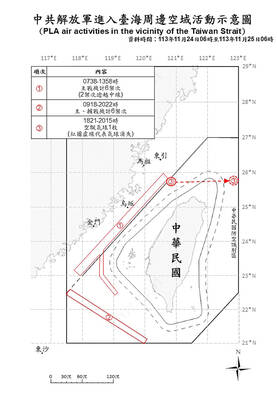The possibility of China rushing into political dialogue with Taiwan after its pending leadership transition is low, as such a hasty move would only impede cross-strait development and put President Ma Ying-jeou (馬英九) in a difficult position, a US academic told a gathering in Washington on Monday.
Alan Romberg, the director of the East Asia Program at the Stimson Center and a specialist on cross-strait affairs, made the remarks at the launch of his new book, Across The Taiwan Strait: From Confrontation to Cooperation 2006-2012, in Washington, which was also attended by former American Institute in Taiwan (AIT) chairman Richard Bush and China expert Ken Lieberthal.
Chinese President Hu Jintao (胡錦濤) said during his work report to the Chinese Communist Party’s (CCP) 18th Party Congress, which ended on Wednesday last week, that both sides of the Taiwan Strait should jointly explore political relations, set up military security confidence-building mechanisms and push for the inking of a peace agreement.
Hu’s statement has given rise to speculations that Beijing will soon push for political talks with Taipei, particularly after he was replaced as CCP chairman by Chinese Vice Premier Xi Jinping (習近平) on the last day of the congress.
“There are no indications yet that either side of the strait will carry out a political dialogue or sign a peace accord, since Ma does not have the flexibility to do so in Taiwan. Besides, he [Ma] has specifically stated that the signing of a cross-strait peace agreement has to be decided via a referendum,” Romberg said.
“Apparently, Ma has no timeline for engaging in cross-strait political talks, or for signing a peace accord,” Romberg said.
Commenting on Hu’s much-publicized work report, Romberg said China would prioritize the establishment of mutual trust between the two sides in an effort to lay the groundwork for political talks.
“Rushing into political dialogue would only hinder cross-strait development and place Ma in an awkward position,” Romberg said.
Turning to Taiwan’s quest for international space, Romberg said China would oppose any issues related to Taiwan’s assertion of sovereignty.
This could be seen in Taiwan-Singapore ties in the form of an economic cooperation agreement instead of a free-trade agreement, over which China expressed serious concern and sought to ascertain if Singapore adhered to the “one-China” policy, Romberg said, urging China to show more flexibility in such matters.

A decision to describe a Chinese Ministry of Foreign Affairs statement on Singapore’s Taiwan policy as “erroneous” was made because the city-state has its own “one China policy” and has not followed Beijing’s “one China principle,” Deputy Minister of Foreign Affairs Tien Chung-kwang (田中光) said yesterday. It has been a longstanding practice for the People’s Republic of China (PRC) to speak on other countries’ behalf concerning Taiwan, Tien said. The latest example was a statement issued by the PRC after a meeting between Singaporean Prime Minister Lawrence Wong (黃循財) and Chinese President Xi Jinping (習近平) on the sidelines of the APEC summit

Taiwan’s passport ranked 34th in the world, with access to 141 visa-free destinations, according to the latest update to the Henley Passport Index released today. The index put together by Henley & Partners ranks 199 passports globally based on the number of destinations holders can access without a visa out of 227, and is updated monthly. The 141 visa-free destinations for Taiwanese passport holders are a slight decrease from last year, when holders had access to 145 destinations. Botswana and Columbia are among the countries that have recently ended visa-free status for Taiwanese after “bowing to pressure from the Chinese government,” the Ministry

HEALTHCARE: Following a 2022 Constitutional Court ruling, Taiwanese traveling overseas for six months would no longer be able to suspend their insurance Measures allowing people to suspend National Health Insurance (NHI) services if they plan to leave the country for six months would be abolished starting Dec. 23, NHIA Director-General Shih Chung-liang (石崇良) said yesterday. The decision followed the Constitutional Court’s ruling in 2022 that the regulation was unconstitutional and that it would invalidate the regulation automatically unless the NHIA amended it to conform with the Constitution. The agency would amend the regulations to remove the articles and sections that allow the suspension of NHI services, and also introduce provisional clauses for those who suspended their NHI services before Dec. 23, Shih said. According to

‘GRAY ZONE’ TACTICS: China continues to build up its military capacity while regularly deploying jets and warships around Taiwan, with the latest balloon spotted on Sunday The US is drawing up contingency plans for military deployments in Japan and the Philippines in case of a Taiwan emergency, Japan’s Kyodo news agency reported. They would be incorporated in a first joint operation plan to be formulated in December, Kyodo reported late on Sunday, citing sources familiar with Japan-US relations. A US Marine Corps regiment that possesses High Mobility Artillery Rocket Systems — a light multiple rocket launcher — would be deployed along the Nansei Island chain stretching from Kyushu to Yonaguni near Taiwan, Kyodo said. According to US military guidelines for dispatching marines in small formations to several locations,